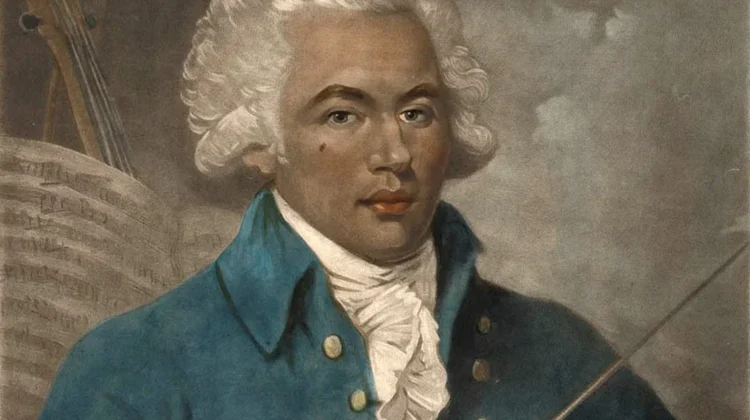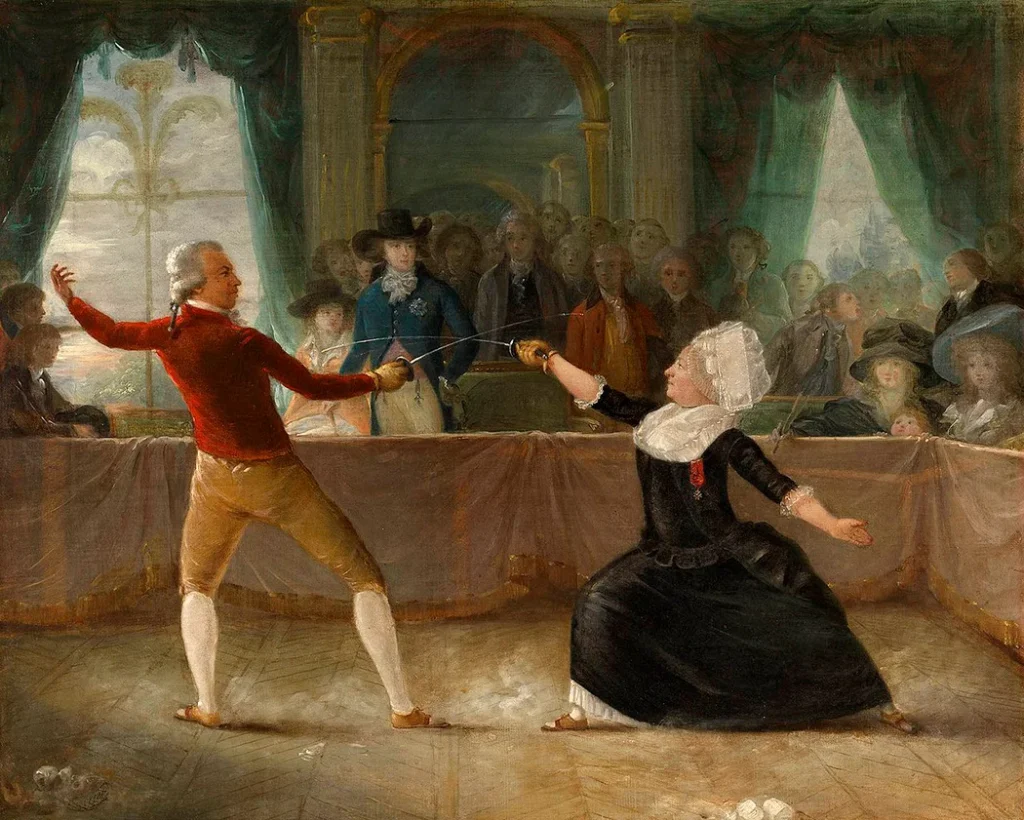
Joseph Bologne, Chevalier de Saint-Georges, was a remarkable figure in 18th-century Europe, a time when racial barriers and societal prejudices often dictated the course of one’s life. As a Black man in a society dominated by racial and class biases, Bologne navigated immense challenges to achieve extraordinary success as a violinist, composer, and fencer. Known as “The Black Mozart,” his life and career offer a fascinating glimpse into the complexities of race, class, and artistic expression during this period. Bologne’s journey was not just about musical brilliance but also a powerful story of resilience and defiance against societal constraints.
Early Life and Education
Joseph Bologne was born in 1745 on the Caribbean island of Guadeloupe, the son of Georges de Bologne Saint-Georges, a wealthy French plantation owner, and Nanon, an enslaved African woman who worked on the plantation. Despite the stigma associated with his mixed-race heritage, Bologne’s father recognized his son’s potential and took him to France at a young age to ensure he received an education that would cultivate his talents.
In France, Bologne was enrolled in prestigious schools where he was trained in fencing, music, literature, and other subjects that were typically reserved for the European elite. He quickly distinguished himself as an exceptional fencer, and by the age of 15, he had become one of the top swordsmen in France. Bologne’s fencing master, La Boëssière, recognized his talent and called him the most extraordinary student he had ever trained.
Alongside fencing, Bologne developed a profound passion for music, studying violin and composition under the tutelage of notable musicians of the time. His early exposure to both worlds—one of the most respected and elite fencing circles and the flourishing musical landscape of France—helped shape Bologne into a Renaissance man of his era. His early life was marked by both privilege and the persistent undercurrent of racial discrimination that would shadow him throughout his career.

A Musical Career
Bologne’s musical career flourished in Paris, where he became a celebrated violinist and conductor. In 1769, he joined the prestigious Concert des Amateurs, an orchestra that was considered one of the finest in Europe. Just a few years later, he was appointed as the orchestra’s concertmaster, and his talent soon propelled him to the role of conductor. Under his leadership, the Concert des Amateurs reached new heights, gaining a reputation as one of the leading orchestras in Paris.
Bologne was not just a performer but also a prolific composer, creating a vast body of work that included symphonies, string quartets, operas, and concertos. His compositions were admired for their technical brilliance, rhythmic complexity, and innovative style, often blending the lightness of French melodies with the structural discipline of Italian and German forms. His violin concertos, in particular, showcased his virtuosic playing and earned him widespread acclaim.
One of Bologne’s notable achievements was his involvement in the commissioning and debut of Joseph Haydn’s Paris Symphonies. He worked alongside the famous composer, bringing new and sophisticated orchestral works to French audiences. Bologne’s own compositions were performed in the most prestigious venues of Paris, and he became a favorite among the nobility, including Queen Marie Antoinette, who frequently attended his concerts.
Overcoming Racial Prejudice
Despite his remarkable talent and accomplishments, Bologne faced significant challenges due to his race. In 18th-century France, racial prejudice was rampant, and societal norms often sought to limit the achievements of individuals of African descent. Bologne’s rise to prominence was met with resistance, as many in French society were unwilling to accept a Black man as an equal, let alone as a leader in the arts.
One of the most blatant examples of racial prejudice occurred when Bologne was nominated to lead the prestigious Paris Opéra. His nomination was met with fierce opposition from a faction within the opera company, including some of its leading ladies who refused to take orders from a man of color. In a petition to the Queen, they expressed their disdain for having a “mulatto” as their director. Ultimately, Bologne was forced to withdraw his nomination, highlighting the limitations imposed on him by racial discrimination.
Bologne also faced personal and professional obstacles that stemmed from the pervasive racial bias of his time. While he was celebrated in musical and social circles, he was often treated as an outsider, and his mixed heritage was frequently used against him in both public and private spheres. Despite these challenges, Bologne continued to compose, perform, and excel, using his platform to break down racial barriers and challenge societal norms.
A Revolutionary Spirit
Beyond music and fencing, Bologne was also actively involved in the social and political movements of his time. During the French Revolution, he aligned himself with revolutionary ideals and led a regiment of soldiers known as the Légion St.-Georges, the first all-Black regiment in Europe. His leadership and courage on the battlefield further demonstrated his commitment to liberty and equality, principles that mirrored his personal battles against racial prejudice.
Bologne’s role in the revolution was another testament to his multifaceted talents and his willingness to defy the roles that society attempted to impose on him. He was a man who excelled not only in the arts but also in the fight for social justice, embodying the spirit of a true Renaissance figure who was unafraid to challenge the status quo.
A Legacy of Excellence
Joseph Bologne’s achievements were extraordinary, especially considering the racial and social obstacles he faced. As a composer, his works continue to be rediscovered and celebrated for their innovation, elegance, and technical mastery. His music, once overshadowed by the racial prejudices of his time, is now recognized as a vital contribution to the classical repertoire, offering a unique voice that enriched the musical landscape of 18th-century Europe.
Bologne’s legacy extends beyond his musical compositions. He is remembered as a pioneer who broke through the barriers of his time, an inspiration for artists of color who followed in his footsteps. His story challenges us to look beyond the racial limitations imposed by society and appreciate the universal human capacity for creativity, resilience, and excellence.
Today, Bologne’s life and works are celebrated through performances, recordings, and scholarly research that continue to bring his story to new audiences. His music serves as a reminder of the rich, diverse heritage of classical music and the countless voices that have shaped it.
Joseph Bologne, Chevalier de Saint-Georges, was more than just a musician or fencer; he was a trailblazer who defied the expectations of his time. His accomplishments as a violinist, composer, and military leader were extraordinary, and his life story serves as a powerful testament to the human spirit’s ability to overcome adversity. By navigating the complexities of race, class, and societal expectations, Bologne left a lasting legacy that continues to inspire and challenge us today. His music, once marginalized, now shines as a symbol of artistic brilliance and the enduring fight for equality.

Leave a Reply